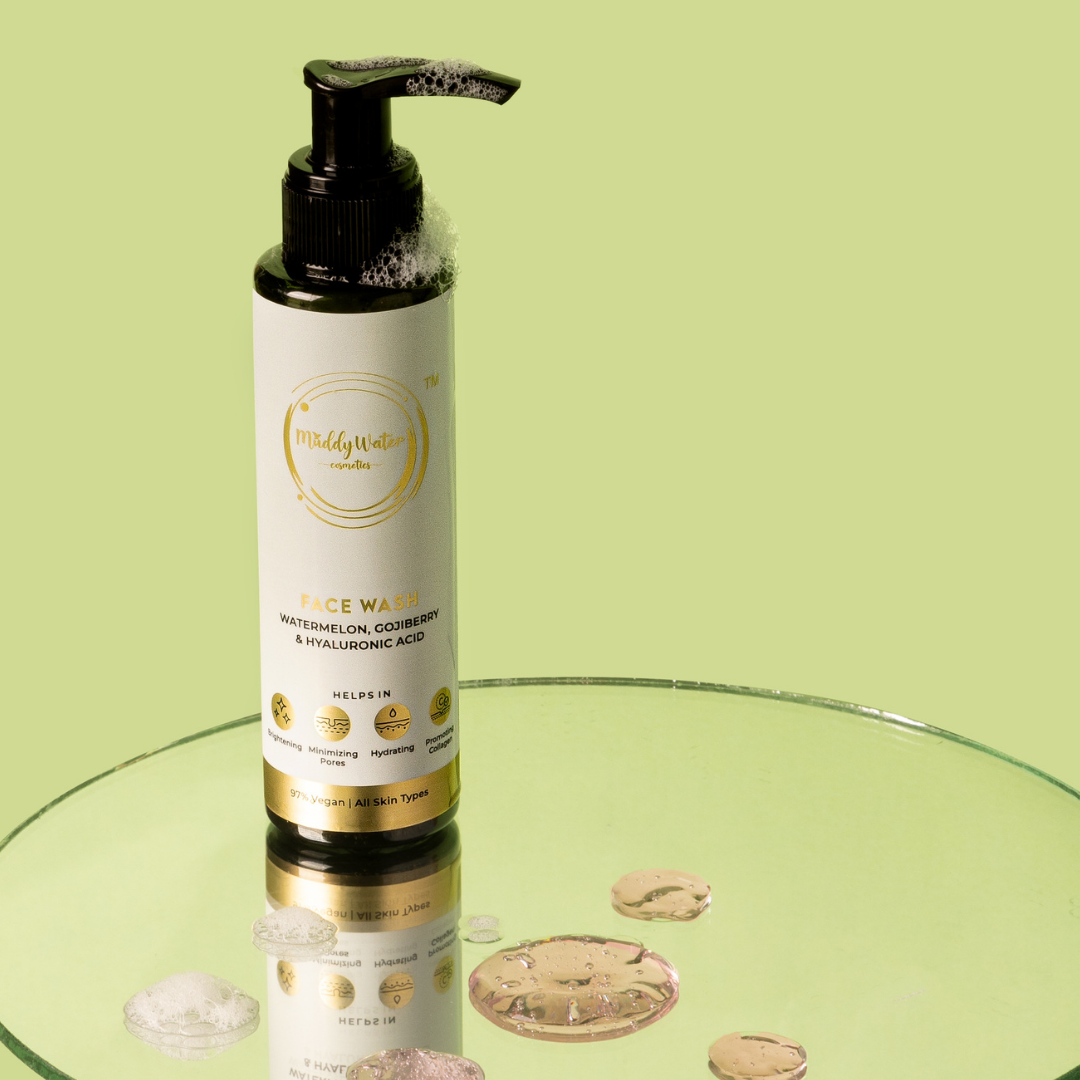ARE SULPHATES ALL THAT BAD?
Sulphates are common cleansing agents in skin and hair care, known for their lathering ability. Currently the whole skin care industry is focused on making “Sulphate Free” cleansers, shampoos and bars. The hydrating cleanser at Muddy Water is also sulphate free. Is it just a trend, marketing gimmick or science? Let’s find out.
WHAT ARE SULPHATES?
- Surfactants that help remove dirt and oil.
- Create a foaming effect in products.
- Help mix oil and water, making it easier to rinse away impurities.
- Common Sulphates:
- Sodium Lauryl Sulfate (SLS): A strong cleanser, can be more irritating.
- Sodium Laureth Sulfate (SLES): Milder than SLS, but still a potent cleanser.
- Ammonium Lauryl Sulfate (ALS)
- Sodium Coco Sulfate (SCS)
BUSTING THE MYTHS – THE TRUTH ABOUT SULPHATES
- Myth: Sulphates are always harmful and should be avoided. Fact: They are effective cleansers, but their suitability varies depending on skin type and formulation.
- Myth: Sulphates cause cancer Fact: There's no scientific evidence linking sulphates to cancer.
- Myth: Sulfate-free products are always better. Fact: Both sulfate-free and sulfate-containing products can be drying or sensitizing depending on the overall formulation and your skin.
- Myth: Sulphates indiscriminately strip the skin of its natural oils Fact: While they can remove oils, the degree of stripping depends on the type and concentration of sulfate used, as well as other ingredients in the product.
- Myth: Sulphates are biodegradable. Fact: While some sulphates are biodegradable, others are not. They can cause concerns for the aquatic life.
HOW SULPHATES FUNCTION IN SKINCARE FORMULATIONS
- Cleansing Action: Sulphates are highly effective at removing sebum (natural skin oil), dirt, and product residue from the skin's surface. Their molecular structure allows them to surround oil and dirt particles, lifting them away so they can be rinsed off with water.
- Foaming Properties: The characteristic lather produced by sulphates is visually appealing to many consumers and contributes to the perception of effective cleansing.
- Emulsification: Sulphates also act as emulsifiers, helping to blend oil-based and water-based ingredients within a product formula, ensuring a stable and consistent texture.
SULPHATES AND HYDRATING FACE WASHES: A BALANCING ACT
A hydrating face wash is specifically formulated to cleanse the skin without stripping it of its essential moisture. The inclusion of hydrating ingredients like humectants (e.g., glycerin, hyaluronic acid), emollients (e.g., plant oils, ceramides), and occlusives aims to counteract the potential drying effects of cleansing agents.
Why Might a Hydrating Face Wash Contain Sulphates?
- Effective Cleansing for Oily Skin: For individuals with very oily skin who still desire a hydrating formula, a low concentration of a milder sulfate like SLES, combined with significant hydrating ingredients, could potentially cleanse effectively without excessive dryness. The hydrating components aim to replenish moisture as the sulphates cleanse.
- Consumer Preference for Foam: Some consumers associate foam with effective cleansing. Formulators might include a small amount of sulfate to satisfy this preference while still incorporating hydrating elements.
Why Should a Hydrating Face Wash Often Not Contain Sulphates?
- Potential to Negate Hydrating Benefits: Even milder sulphates can still have a stripping effect on the skin barrier. This can counteract the efforts of the hydrating ingredients, making the wash less effective at maintaining moisture balance.
- Risk of Over-Cleansing and Irritation: The primary goal of a hydrating face wash is gentle cleansing. Sulphates, by their nature, are potent cleansers and can easily lead to over-cleansing, especially for those with dry, sensitive, or already compromised skin. This can impair the skin barrier and hinder hydration.
- pH Balance: Our skin is slightly acidic while most sulphates tend to be on the alkaline side of the pH scale. Using cleansers with sulphates can alter the pH of our skin, disrupting the overall skin barrier and hence causing irritation and sensitivity. The right cleanser will help to rebalance the pH on the surface of your skin, which will go a long way in rectifying some of the visible skin concerns that you may be dealing with.
- Availability of Gentle Alternatives: Numerous effective, non-sulfate surfactants are available that offer gentle cleansing without the same level of potential for stripping. These are often preferred in hydrating formulations.
- Environmental Impact: Let’s be considerate. We would not want to suffocate the environment, especially the aquatic life in this case, for just that luxurious feeling foaming experience.
In most cases, a truly hydrating face wash benefits more from the inclusion of gentle, non-sulfate cleansing agents. Formulators prioritizing hydration typically opt for surfactants like:
- Coco-Glucoside: A mild, plant-derived surfactant.
- Decyl Glucoside: Another gentle, plant-derived surfactant.
- Sodium Cocoyl Isethionate (SCI): A milder, sulfate-free surfactant that still provides some lather.
The Bottom Line
While it's possible for a hydrating face wash to contain sulphates, it often represents a compromise to the skin and the planet. The potential for stripping outweighs the benefits for most skin types seeking hydration. Truly hydrating formulas typically prioritize gentle, sulfate-free cleansing agents to effectively cleanse without compromising the skin's moisture barrier.
And this is why Muddy Water Hydrating Face Wash has no sulphates. It is made for gentle cleansing and maintaining a healthy skin microflora without the stretchy, drying feeling after washing.
Always check the ingredient list and consider your skin type when choosing a hydrating face wash.
Cleansing is the first step to a great skin. Choose wisely.
Happy Skin Care!


